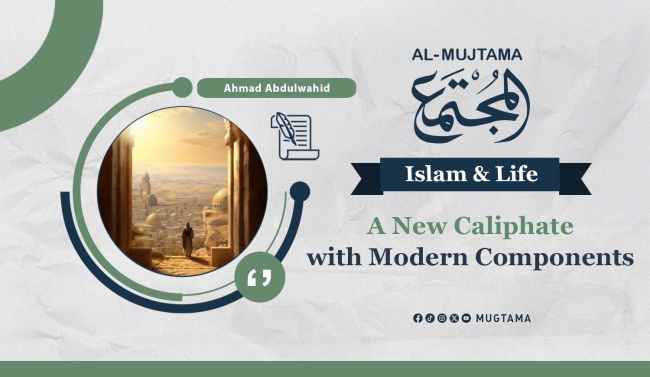The commemoration of the 100th anniversary of the fall of the Islamic caliphate brings forth many questions and challenges, given the state of weakness and disintegration the ummah is experiencing, alongside internal unrest in several Arab countries, in addition to regional conflicts between nations that share the same religion, Islam.
This situation is grave and calls for new perspectives, reflections, and readings of the scene from various angles, provided they are outside the box, in an attempt to formulate new forms, frameworks, and patterns for a modern caliphate.
Continuing to lament and mourn over spilled milk, while waiting for another 100 years to pass, is perhaps a mistake. Then we commemorate the future anniversary of the 200th year since the downfall of the caliphate, by the hands of the Turkish military leader Mustafa Kemal Atatürk, who executed the plan to abolish the Ottoman caliphate that once united the Islamic lands under its umbrella.
Nowadays, 57 countries are affiliated with the Organization of Islamic Cooperation, spanning across 4 continents, covering an area of approximately 32 million square kilometres – nearly a quarter of the Earth's landmass, which is around 149 million square kilometres. These countries overlook vital seas, oceans, and straits, possessing vast natural resources including water, oil, gas, and gold.
Let the beginning be from Turkey itself, which has once again risen to stand on its feet, among the top 20 economies in the world, amidst diligent efforts to leap into the top 10 global economies. Turkish exports achieved a tremendous leap in 2023, surpassing the $255 billion mark, despite the earthquake disaster, the COVID-19 pandemic, and regional wars and their repercussions, according to data released by the Turkish Exporters Assembly.
Militarily, the Turkish army ranks first in the Middle East and 11th globally out of 145 countries in the annual ranking of the world's strongest armies for the year 2023, according to the "Global Firepower" website specializing in military rankings.
On the artistic front, Turkish drama ranked third behind the United States and Britain, among the largest exporters of television series, recording a remarkable 184% increase in global demand for Turkish shows between 2020 and 2023, according to Parrot Analytics data company.
Turkish series are broadcast in more than 170 countries around the world, reaching nearly 750 million people, according to Batuhan Mumcu, Turkish Deputy Minister of Culture and Tourism.
We are thus witnessing a rising Turkish influence politically, militarily, economically, culturally, and artistically, carrying with it a new spirit that reimagines the concept of the caliphate from a new perspective, within the framework of current power dynamics. Ankara is becoming a regional and international player influencing issues such as Palestine, Syria, Iraq, Libya, Sudan, Azerbaijan, Armenia, Ukraine, and the Eastern Mediterranean.
On the other hand, when nearly two billion Muslims rely on the world, or in other words, consume and import more compared to other peoples and nations, we are facing another crime of deliberately overthrowing the Islamic caliphate or postponing its restoration, militarily, economically, and culturally.
Let's be honest together: When we achieve self-sufficiency and are able to produce what meets our material and moral needs and fills our civil and military gaps, then we will not be dependent on anyone, and no one will control our destinies. This self-reliance and sufficiency will grant us the dignity that God has ordained for us: "But all honour and power belongs to Allah, His Messenger, and the believers" (Quran, Surah Al-Munafiqun 63:8).
Looking at the list of the top ten arms-exporting countries, the extent of Western dominance becomes apparent, starting with the United States (40%), followed by Russia (16%), France (11%), China (5.2%), Germany (4.2%), Italy (3.8%), Britain (3.2%), Spain (2.6%), South Korea (2.4%), and "Israel" (2.3%).
Meanwhile, nine Arab countries top the list of the largest arms importers between 2018 and 2022: Saudi Arabia, Qatar, Egypt, the United Arab Emirates, Kuwait, Algeria, Morocco, Jordan, and Bahrain, according to a report by the Stockholm International Peace Research Institute (SIPRI) in March 2023.
In light of this reality, doesn't the billion-strong Muslim nation deserve to produce its own weapons, food, and medicine, to move out of the lists of top importers and take a leading position in the lists of top producers and exporters? This would represent a new form of caliphate restoration, in accordance with the requirements of the 21st century.
It's not necessary for the caliphate to return in its old form, with an Ottoman emperor or a king ruling East and West. Perhaps it's more realistic to break free from that image, accompanied by political and economic liberation from Western dependence, genuine independence from the White House's will, and a real victory over intellectual and cultural invasion, as well as a defeat of hegemonic and normalization schemes.
When we become one unified nation, where the blood of its sons is spared, and its internal cohesion is strengthened, and its regional conflicts are resolved without foreign intervention or resorting to international organizations and bodies that neither satisfy nor enrich, then we will reclaim our caliphate from a new perspective.
And when the nation rallies, and its countries rush to support our brothers in Palestine, and aid our people in Gaza, with weapons, money, provisions, boycotts, prayers, and every available means, in accordance with what Islam dictates, then we regain some of the fragrance and glory of the caliphate.
In conclusion, if countries, united by one religion, one God, and one Prophet, come together and cooperate, revitalizing their trade and markets, exchanging their wheat and oil, producing their weapons and medicine, and making knowledge and labour their path, the world will witness a great power and a new caliphate, with modern principles.
-------------------------------------------------------------







